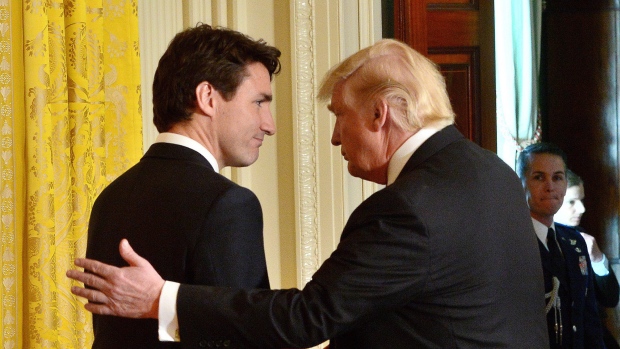Jul 14, 2017
Hit list: Pressure points the U.S. may target in NAFTA negotiations

The United States is expected to unveil its detailed objectives for the renegotiation of the North American Free Trade Agreement on Monday, formalizing its demands for a trilateral pact that U.S. President Donald Trump has long decried as a bad deal creating an unfair playing field for American workers.
While Canada initially appeared to escape Trump’s ire as the U.S. president blasted Mexico and China, his tone and actions have hardened in recent months as the triumvirate inch closer to the negotiating table. The Trump administration has appeared to target three key pressure points in the Canadian economy in trade talks, talking tough on two and taking action on another.
"Steel is a big problem. Steel is, I mean, they're dumping steel. Not only China, but others. We're like a dumping ground, okay? They're dumping steel and destroying our steel industry, they've been doing it for decades, and I'm stopping it," – U.S. President Donald Trump - July 13, 2017
Trump has repeatedly taken aim at foreign steelmakers as a source of American job losses in the sector, which had a devastating effect on the American Midwest. Though his most pointed comments have been saved for China, which is already subject to 20 separate antidumping and countervailing duties, Trump broadened his attack on Thursday.
Canada is indeed the top foreign source for steel, accounting for 17 per cent of U.S. imports in 2016, though both countries actually run a trade deficit with the world. Many of the competitive factors that hit the American industry also hollowed out mills along the northern side of the Great Lakes. Any trade action could be particularly painful for the already encumbered industry, as 88 per cent of Canadian exports head south of the border, though steel represents just 1.3 per cent of the total goods Canada exported in 2016.
Any onerous duties could actually have the unintended consequence of increasing U.S. reliance on steel sourced from China thanks to Trump’s plans to invest heavily in infrastructure.
“I was in Wisconsin the other day, and I want to end and add by saying that Canada, what they've done to our dairy farm workers is a disgrace. It's a disgrace,” – U.S. President Donald Trump – April 20, 2017
Canada’s supply management has long been a point of contention not just with the United States, but Europe and New Zealand. Though Trump has railed repeatedly against the Canadian industry, based on the numbers alone, Ottawa might want to consider making the dairy cow a sacrificial lamb. Canada’s substantial, and widening dairy trade deficit with the United States now stands at $440 million and Canadian exports account for a fraction of the overall industry’s revenue.
Here too, Trump could hurt the average American he’s vowed to stand up for in trade disputes. U.S. per capita consumption across all dairy products hit an all-time high of 627 pounds in 2015, a 10 per cent increase from 20 years earlier according to data compiled by the U.S. Department of Agriculture.
“Things like this I don't regard as being a good neighbour, dumping lumber," – U.S. Commerce Secretary Wilbur Ross – April 25, 2017
The U.S. has fired a pair of salvos already in the softwood lumber fight, leveling countervailing and anti-dumping duties against Canadian producers of up to 31 per cent. The dispute, the fifth in the last 40 years, comes down to U.S. producers arguing Canada artificially subsidizes its forestry industry by setting stumpage fees too low. The topic will likely be central to renewed trade talks due to its long-simmering nature, though there is speculation it could be resolved before formal NAFTA talks commence.
Hamir Patel of CIBC Capital Markets told clients on Thursday that he sees greater than 50 per cent odds a deal could be sealed by the end of August. Such a scenario would be a welcome relief to prospective U.S. homebuyers, who have seen the renewed duties add more than $1,600 to the cost of a new house.
While consumers on both sides of the border will ultimately face higher costs if NAFTA negotiations add a series of tariffs, Trump has long declared he’s primed for a fight. When asked point blank on April 25 if he feared a trade war with Canada, Trump simply responded “No, not at all.”